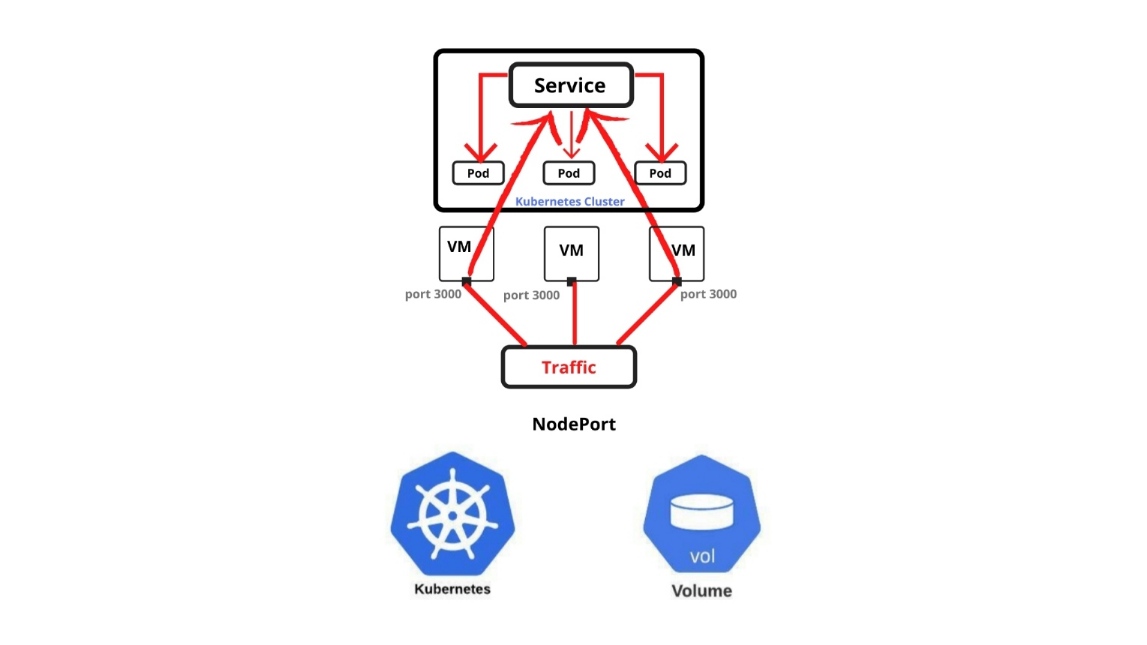🔎 Exploring NodePort and Volumes in Kubernetes
 Mohmmad Saif
Mohmmad Saif
In Kubernetes, NodePort and volumes are essential components for exposing services and managing persistent storage.
NodePort
NodePort is a type of Kubernetes service that exposes an application running on a set of pods to the external network. It assigns a static port on each node's IP, enabling external traffic to access the service using <NodeIP>:<NodePort>. This port range typically falls between 30000-32767 and is defined in the service configuration. NodePort services are handy for testing and small-scale deployments. However, for production environments, LoadBalancer or Ingress resources are generally preferred for more robust and scalable traffic management.
How NodePort Works:
Service Type: You define a service of type
NodePort.Port Allocation: Kubernetes allocates a port from a range (default: 30000-32767).
Access: External users can access the service via
<NodeIP>:<NodePort>.
Example Configuration:
apiVersion: v1
kind: Service
metadata:
name: my-service
spec:
type: NodePort
selector:
app: my-app
ports:
- port: 80 # Port on the service
targetPort: 8080 # Port on the Pod
nodePort: 30036 # Optional, specify NodePort
Volumes
Volumes in Kubernetes provide persistent storage to containers, ensuring data remains intact across pod restarts. Unlike ephemeral container storage, which is lost when a container is terminated, volumes maintain data persistence. Kubernetes supports various volume types, including emptyDir, hostPath, persistentVolumeClaim, and cloud-specific volumes like awsElasticBlockStore and gcePersistentDisk. Defined within a pod's specification, volumes enable data sharing between containers in the same pod and maintain data throughout the pod's lifecycle. This feature is essential for stateful applications and data consistency in Kubernetes environments.
Types of Volumes:
emptyDir: Temporary storage, erased when the pod is removed.
hostPath: Maps a file or directory from the host node’s filesystem.
nfs: Network File System volume that allows sharing storage across multiple nodes.
persistentVolumeClaim (PVC): Requests storage resources dynamically from a Persistent Volume (PV).
Example Configuration:
Using emptyDir:
apiVersion: v1
kind: Pod
metadata:
name: my-pod
spec:
containers:
- name: my-container
image: busybox
volumeMounts:
- mountPath: /data
name: my-volume
volumes:
- name: my-volume
emptyDir: {}
Using PersistentVolumeClaim (PVC):
- PersistentVolume (PV)
apiVersion: v1
kind: PersistentVolume
metadata:
name: my-pv
spec:
capacity:
storage: 1Gi
accessModes:
- ReadWriteOnce
hostPath:
path: /mnt/data
- PersistentVolumeClaim (PVC)
apiVersion: v1
kind: PersistentVolumeClaim
metadata:
name: my-pvc
spec:
accessModes:
- ReadWriteOnce
resources:
requests:
storage: 1Gi
- Using PVC in a Pod
apiVersion: v1
kind: Pod
metadata:
name: my-pod
spec:
containers:
- name: my-container
image: busybox
volumeMounts:
- mountPath: /data
name: my-volume
volumes:
- name: my-volume
persistentVolumeClaim:
claimName: my-pvc
Key Concepts:
Service: A Kubernetes abstraction that defines a logical set of Pods and a policy for accessing them.
Pod: The smallest and simplest Kubernetes object, representing a set of running containers on your cluster.
Volume: A directory, possibly with some data, accessible to the containers in a Pod.
PersistentVolume (PV): A piece of storage in the cluster provisioned by an administrator or dynamically using Storage Classes.
PersistentVolumeClaim (PVC): A user request for storage, allowing Pods to request specific sizes and access modes.
Summary:
Kubernetes uses NodePort and volumes to provide external access to services and persistent storage solutions, enabling robust and scalable application deployments.
Subscribe to my newsletter
Read articles from Mohmmad Saif directly inside your inbox. Subscribe to the newsletter, and don't miss out.
Written by

Mohmmad Saif
Mohmmad Saif
👋Hello I am Mohd Saif, passionate technology enthusiast currently pursuing a bachelor of Computer application degree. 🎓Education: I am currently pursuing a bachelor of Computer application degree with the focus on coding at Bareilly University my education journey has equipped me with strong foundation in Computer science and I am eager to apply my knowledge to real word challenges. 💡Passion for technology: I have always been deeply passionate about technology and I am particular drawn to devops with AWS. 🚀Skills: 🔹Linux 🔹Shell scripting 🔹Python 🔹Ansible 🔹Docker 🔹Kubernetes 🔹Jenkins CI/CD 🔹Maven 🔹Git and GitHub ✨Future goals: My goal is to facilitate seamless collaboration between development and operations teams, ensuring faster releases and high-quality software. I am a proactive learner, constantly exploring new DevOps trends and practices